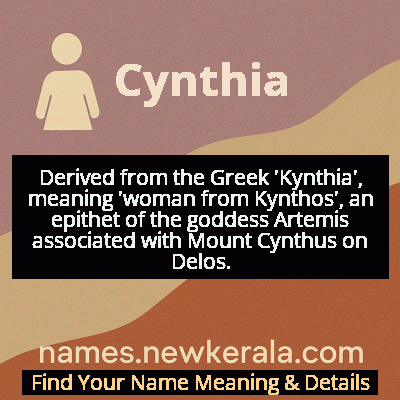Cynthia Name Meaning & Details
Origin, Popularity, Numerology Analysis & Name Meaning of Cynthia
Discover the origin, meaning, and cultural significance of the name CYNTHIA. Delve into its historical roots and explore the lasting impact it has had on communities and traditions.
Name
Cynthia
Gender
Female
Origin
Greek
Lucky Number
8
Meaning of the Name - Cynthia
Derived from the Greek 'Kynthia', meaning 'woman from Kynthos', an epithet of the goddess Artemis associated with Mount Cynthus on Delos.
Cynthia - Complete Numerology Analysis
Your Numerology Number
Based on Pythagorean Numerology System
Ruling Planet
Saturn
Positive Nature
Ambitious, efficient, realistic, and authoritative.
Negative Traits
Materialistic, stressed, confrontational, and can be overly ambitious.
Lucky Colours
Dark blue, black.
Lucky Days
Saturday.
Lucky Stones
Blue sapphire, amethyst.
Harmony Numbers
2, 4, 6.
Best Suited Professions
Business leaders, managers, financial services, law enforcement.
What People Like About You
Leadership, determination, organizational skills.
Famous People Named Cynthia
Cynthia Nixon
Actress
Emmy Award-winning actress known for Sex and the City, political activist
Cynthia Erivo
Actress and Singer
Tony, Emmy and Grammy Award winner for The Color Purple, Oscar nominee
Cynthia Ozick
Writer
Influential American novelist and essayist, National Book Award finalist
Cynthia McKinney
Politician
Former U.S. Congresswoman and 2008 Green Party presidential candidate
Name Variations & International Equivalents
Click on blue names to explore their detailed meanings. Gray names with will be available soon.
Cultural & Historical Significance
The Renaissance witnessed a significant revival of Cynthia as poets and scholars rediscovered classical texts, using the name to evoke classical elegance and mythological grandeur. During the 18th century, Cynthia became fashionable among English aristocracy, symbolizing refinement and classical education. The name's journey through Western culture reflects changing attitudes toward feminine identity—from divine independence in ancient times to romantic idealization in classical poetry to respectable sophistication in modern history. This rich cultural tapestry makes Cynthia more than just a name; it's a vessel carrying millennia of artistic, literary, and mythological significance that continues to resonate in contemporary naming practices.
Extended Personality Analysis
People named Cynthia often exhibit a fascinating blend of logical precision and emotional depth, reflecting the moon's dual nature of being both scientifically measurable and mystically evocative. They typically possess strong intuitive abilities that allow them to read situations and people with remarkable accuracy. This intuition, combined with natural intelligence, makes Cynthias excellent problem-solvers who can approach challenges from both analytical and creative perspectives. Their lunar association suggests a personality that operates in cycles—periods of intense activity and social engagement followed by necessary retreat and reflection.
Cynthias are often perceived as naturally authoritative without being authoritarian, possessing a quiet confidence that inspires trust in others. They tend to be highly adaptable, able to navigate different social environments while maintaining their core identity. Many display a protective nature toward those they care about, reminiscent of Artemis's role as protector of young women and animals. While they can appear reserved to strangers, closer relationships reveal a warm, loyal, and often surprisingly witty individual. Their independence is a defining characteristic—they value autonomy and self-sufficiency but within the context of meaningful connections to family, friends, and community. This balance between self-reliance and relationship-building makes Cynthias particularly effective in leadership roles where both decisiveness and empathy are required.
Modern Usage & Popularity
In contemporary naming practices, Cynthia maintains a position as a respected classic that peaked in mid-20th century America but continues to see steady, though reduced, usage. The name ranked among the top 20 most popular girls' names in the United States throughout the 1950s and 1960s, reflecting its broad appeal during the post-war era. While its popularity has significantly declined since the 1980s—currently ranking outside the top 500—it remains a recognizable and well-regarded choice. Modern parents selecting Cynthia often appreciate its classical roots, literary connections, and the strong, intelligent image it projects without being overly common in current naming trends. The name enjoys particular staying power in Hispanic communities, where variations like 'Cinthia' remain popular. Interestingly, while the full name Cynthia has become less common, its diminutive 'Cindy' experienced its own wave of popularity and now shares similar classic status. The name's decline in recent decades may actually enhance its appeal for parents seeking a traditional name that stands out from more contemporary choices while carrying substantial historical and cultural weight.
Symbolic & Spiritual Meanings
Symbolically, Cynthia embodies the profound metaphorical meanings associated with the moon across cultures and centuries. It represents the illumination of darkness—not through overwhelming brightness, but through gentle, persistent light that reveals what was previously hidden. This makes the name symbolic of wisdom, intuition, and the revelation of truths that exist beneath surface appearances. The moon's cyclical nature connects Cynthia to themes of transformation, renewal, and the natural rhythms of life—birth, growth, decline, and rebirth. In psychological terms, the name symbolizes the subconscious mind, dreams, and the internal landscape of human emotion and creativity.
The name also carries the symbolism of reflected glory, representing how individuals can achieve greatness not necessarily through innate talent alone, but through their ability to reflect and magnify the light of others—much like the moon reflects sunlight. This makes Cynthia symbolic of mentorship, guidance, and the power of influence. In feminist interpretation, the name reclaims Artemis's virginity as symbolic of female autonomy and self-determination rather than sexual abstinence. The moon's governance over tides connects Cynthia to emotional depth, intuition, and the unseen forces that shape human experience. Ultimately, the name represents the beautiful paradox of being both constant and changing, familiar and mysterious—qualities that make Cynthia an enduring symbolic representation of the complex, multifaceted nature of feminine identity and power.

